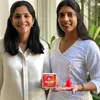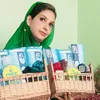5 women who are cracking down on menstrual hygiene myths with their brands
Cutting through the social stigma surrounding menstrual hygiene, these women are heeding to the needs of women’s health.
The whispered tone surrounding menstrual hygiene continues to exist to this day and age, but there are some changemakers who are determined to start the conversation, educate people, and help women be comfortable during their periods.
While menstruation and menstrual hygiene talks are still brushed under the carpet, these five entrepreneurs are breaking the stigma and prompting people to openly talk about it.
That Sassy Thing by Sachee Malhotra
Sachee Malhotra does not have very fond memories of her school days. She was constantly ridiculed for having excessive facial and body hair and being overweight. She had also experienced severe painful periods due to living with PCOS syndrome for the past 15 years.
“There is a need to have open and honest conversations around women and their bodies, how they feel, and what they go through. Further, most sexual wellness products are made by brands run by men for men,” Sachee says.
This episode prompted her to start The Sassy Things with an initial investment of Rs 30 lakh. After two years of product formulation and sourcing manufacturers, the brand was officially launched in December 2020.
With a vision to build a quirky yet bold brand, the emphasis is on building and engaging a community to initiate conversations around sexual hygiene.
Bootstrapped, the brand also makes sure to include and represent real body types on its social media. The brand mainly deals in three main products - period cramp roll-on, pubic hair oil, and lubricant.
Asan by Ira Guha
In 2017, when Ira Guha was doing her Master’s in Public Policy at the Harvard-Kennedy School, she visited her parents in Bengaluru. During her visit, she found out one of her mother’s part-time cooks, Mary, was on leave as she was unwell. On her return, she told Ira that she missed work because of her periods. On further prodding, she revealed how uncomfortable the Rs 2 sanitary pads are, and how that gave her rashes and also a urinary tract infection (UTI).
“I had been using the menstrual cup ever since I was a student of Politics at the University of Cambridge and working in the UK. I had an extra one and gave it to Mary to try. She found it easy and comfortable to use and asked one for her sister as well. Later, we distributed a few to the domestic workers at our place in Coonoor,” says Ira.
This incident led her to take the plunge, and soon she started spending over $300 on menstrual cups before her visits to India. Being a public policy student who was working towards social impact, designing and launching a menstrual cup seemed to be the right idea at the time.
Ira then went on to design ‘the world’s best cup for women’ with a proprietary design - “removal ring”. This saw the launch of the Asan menstrual cup in January this year. Ira partnered with Anuradha Mahadevan, a former consultant and engineer with deep local market expertise, for its launch in India.
Asan menstrual cups are designed by engineers at the Harvard Innovation Lab. It took two years of product development and four rounds of user testing to perfect the unique design. The cup is made from medical-grade silicone and features a unique removal ring. It can be used for up to 10 years.
Keeping in mind the restricted reach of menstrual cups ,especially in rural areas, Ira and Anuradha launched a ‘buy one, donate one’ campaign. For this, the startup has partnered with women’s health NGOs working in the villages in Kanakapura (outskirts of Bengaluru) to donate menstrual cups.
FLOH Tampons by Gauri Singha
Founded by 25-year-old Gauri Singhal, FLOH Tampons is the menstrual health and hygiene brand under the parent company Visionaari.
The brand is on a mission to reach out to the women of today with better solutions to take care of their personal needs. According to Gauri, tampons help women have a more comfortable period, especially those who lead a very active lifestyle.
She says that FLOH’s core ideology is to “share life-changing menstrual care products with passionate, on-the-go women of today.”
In its one year of operation, the brand has already acquired 50,000 unique customers across India. Gauri says that FLOH has grown its customer base by creating a ‘360-degree product awareness’ across channels.
As a part of their “digital first’ nature, FLOH launched a video campaign called Millennials at your cervix, where a group of millennials, both men and women, voiced their opinions about menstruation and menstrual hygiene.
FLOH is currently bootstrapped and conducts regular awareness sessions at schools, colleges, and corporates. Their aim is to create awareness amongst millennials and make life-changing menstrual hygiene products that are easily accessible, economical, and convenient for them.
Heyday by Deepanjali Kanoria
Born and brought up in Delhi, Deepanjali has worked as a financial analyst at Ernst & Young in Manhattan for around a year before switching her career path to entrepreneurship.
Heyday was launched in October 2017, and was recognised as a Forbes 30 under 30 Asia and India. The startup is focused on producing organic and biodegradable sanitary pads, panty liners, menstrual cups, and baby diapers.
It ensures its commitment to being an end-to-end sustainable brand by using degradable packaging to serve its loyal customer base of about four lakh people.
Bootstrapped so far, the startup broke even in one-and-a-half years and saw 3x growth.
The competitors in the organic industry include Nua Woman, PeeSafe, and Azah. Deepanjali believes the increasing number of competitors shows the unmet demand for innovative personal care in India.
The startup claims to conduct extensive research for each product and make it affordable for its users. Moving ahead, the founder hopes to introduce a new product every six months and expand internationally.
Eva Safety Door by Irfana Zargar
Twenty-eight-year-old Irfana is a household name in the Valley today. For the past six years, she has been providing free sanitary pads to hundreds of women across Kashmir, and has supplied more than a dozen public toilets with sanitary kits in Srinagar.
“I have been working for this cause since 2014 when my father Ghulam Hassan Zargar died of cardiac arrest. Without being funded by any non-governmental organisation (NGO) or government, I am paying from my own pocket despite being a contractual low-paid employee at Srinagar Municipal Corporation (SMC),” Zargar tells HerStory.
What started as a way of honoring her father’s death soon turned into a mission. She started distributing sanitary pads to young girls in the city.
When asked about the name, she explains, “‘Eva’ means ‘women’ and ‘safety door’ refers to the fact that the initiative is a door that opens to their safety,”
Till now, she claims to have distributed more than 10,000 sanitary pads in the last seven months besides distributing menstrual kits in 15 public washrooms around Srinagar city.
Edited by Anju Narayanan











